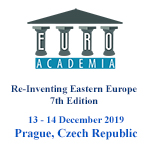Euroacademia Conferences
 Europe Inside-Out: Europe and Europeanness Exposed to Plural Observers (9th Edition) April 24 - 25, 2020
Europe Inside-Out: Europe and Europeanness Exposed to Plural Observers (9th Edition) April 24 - 25, 2020 Identities and Identifications: Politicized Uses of Collective Identities (9th Edition) June 12 - 13, 2020
Identities and Identifications: Politicized Uses of Collective Identities (9th Edition) June 12 - 13, 2020 8th Forum of Critical Studies: Asking Big Questions Again January 24 - 25, 2020
8th Forum of Critical Studies: Asking Big Questions Again January 24 - 25, 2020 Re-Inventing Eastern Europe (7th Edition) December 13 - 14, 2019
Re-Inventing Eastern Europe (7th Edition) December 13 - 14, 2019 The European Union and the Politicization of Europe (8th Edition) October 25 - 26, 2019
The European Union and the Politicization of Europe (8th Edition) October 25 - 26, 2019 Identities and Identifications: Politicized Uses of Collective Identities (8th Edition) June 28 - 29, 2019
Identities and Identifications: Politicized Uses of Collective Identities (8th Edition) June 28 - 29, 2019 The European Union and the Politicization of Europe (7th Edition) January 25 - 26, 2019
The European Union and the Politicization of Europe (7th Edition) January 25 - 26, 2019 7th Forum of Critical Studies: Asking Big Questions Again November 23 - 24, 2018
7th Forum of Critical Studies: Asking Big Questions Again November 23 - 24, 2018 Europe Inside-Out: Europe and Europeanness Exposed to Plural Observers (8th Edition) September 28 - 30, 2018
Europe Inside-Out: Europe and Europeanness Exposed to Plural Observers (8th Edition) September 28 - 30, 2018 Identities and Identifications: Politicized Uses of Collective Identities (7th Edition) June 14 - 15, 2018
Identities and Identifications: Politicized Uses of Collective Identities (7th Edition) June 14 - 15, 2018
European Integration Through Pragmatic Considerations: A Complex Relationship Between its Wanted and Unwanted Aspects
-
-

-
Presentation speakers
- Lia Tsuladze, Tbilisi State University / Center for Social Sciences (CSS), Tbilisi, Georgia
Abstract:
The paper discusses political and intellectual elites and populations’ discourses on European Integration in Georgia. It focuses on Georgians’ pragmatic expectations related to European integration in terms of protecting human rights and safeguarding the country against Russian threats. The research is based on the mixed-method approach integrating both qualitative and quantitative components. The target group consists of, on the one hand, political and intellectual elites (31 respondents) who have been inquired based on in-depth interviews, and on the other hand, population residing in the capital and main cities of Eastern and Western Georgia, who have participated in focus group discussions (18 focus groups, 137 respondents). Q methodology has been incorporated in both in-depth interviews and focus group discussions. Despite its quantitative focus, Q methodology is used with rather small samples enabling a deeper analysis of individual cases, as well as enriching a qualitative perspective. As Q analysis shows, the statements that Georgia’s European integration will result in the better protection of human rights and that the EU will safeguard the country against Russian threats have the highest positive correlations among the interviewed political and intellectual elites, as well as the population. Based on Z-Score variance that measures the consensus-dissensus among various factors, the abovementioned two factors are closely correlated, which indicates that the democracy and security issues are perceived as interconnected. However, concurrently the qualitative data reveal certain resistance to the above ideas among the same target groups who argue that Georgians are “historically tolerant” and hence do not need to be taught tolerance and human rights protection by the EU. Furthermore, despite considering the EU the country’s main safeguard against Russian threats, Georgians still question the EU’s willingness to confront Russia because of small and minor Georgia. Such a vision reflects Georgians’ concerns about the country’s status insecurity and the double power asymmetry with Russia and the EU. Furthermore, the abovementioned ambivalent views point to a complex relationship between the wanted and unwanted aspects of European integration in Georgia.
-
Related Presentations

Looking towards East on 16th Century Maps
- Ioana Zamfir

Tivat’s Trajectory - From Arsenal to Porto Montenegro
- Ksenija Martinovic

On the Edge of ‘Europe’? A Polish Bridge Between East and West?
- Christopher Reeves













